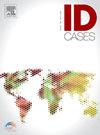Two patients with endometriosis require peripregnancy surgical treatment for pelvic abscesses after egg collection and embryo transfer
IF 1.1
Q4 INFECTIOUS DISEASES
引用次数: 0
Abstract
Assisted reproductive technology procedures infrequently cause pelvic abscesses, but the risk is higher in patients with endometriosis. If antibiotic treatment of a pelvic abscess is unsuccessful, surgery is required—even during pregnancy. We report two patients with endometriosis who suffered from pelvic abscesses formed after egg collection and embryo transfer. Patient 1 underwent laparoscopic resection of the left adnexa and right ovarian cystectomy after diagnosis of the implantation failure. Surgical findings showed severe adhesions in the pelvis due to endometriosis. Patient 2 underwent open drainage surgery at 11 weeks of pregnancy due to pan-peritonitis caused by a pelvic abscess. The patient delivered at 36 weeks of gestation. We conclude that egg collection and embryo transfer in patients with endometriosis confers a high risk for pelvic infection. An accurate diagnosis and appropriate treatment, including surgery, are mandatory in case of severe pelvic abscesses during pregnancy to save both mother and fetus.
2例子宫内膜异位症患者在取卵和胚胎移植后需要围妊娠期手术治疗盆腔脓肿
辅助生殖技术手术很少引起盆腔脓肿,但子宫内膜异位症患者的风险更高。如果盆腔脓肿的抗生素治疗不成功,甚至在怀孕期间也需要手术。我们报告了两例子宫内膜异位症患者,在卵子收集和胚胎移植后形成盆腔脓肿。患者1在诊断为着床失败后行腹腔镜左附件切除和右卵巢囊肿切除术。手术结果显示子宫内膜异位症导致骨盆严重粘连。患者2在妊娠11周时因盆腔脓肿引起的泛腹膜炎行开放引流手术。病人在妊娠36周分娩。我们得出结论,子宫内膜异位症患者的卵子收集和胚胎移植会增加骨盆感染的风险。对于妊娠期严重盆腔脓肿,必须进行准确的诊断和适当的治疗,包括手术,以挽救母亲和胎儿的生命。
本文章由计算机程序翻译,如有差异,请以英文原文为准。
求助全文
约1分钟内获得全文
求助全文

 求助内容:
求助内容: 应助结果提醒方式:
应助结果提醒方式:


